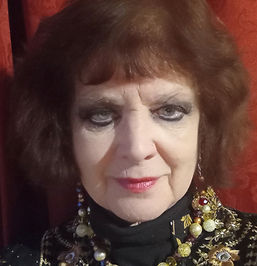REMEMBERING DEBORAH
- Jean Rafferty
- Oct 21, 2019
- 3 min read
Updated: Oct 22, 2019

I heard about Deborah Orr’s final illness on Twitter, which seemed appropriate. Lots of journalists embraced Twitter but Deborah was an addict, the sort of person who sneaked out of her own dinner parties to tweet.
I wasn’t close to her (we lived too far away for that) but loved and respected her - and owed her a lot. People have been talking about her courage and honesty but she was also very kind. Yes, she was a sarcastronaut, as Greg McHugh calls it, sometimes blunt to the point of rudeness - You’re odd, she said to me once - but she was also a person who cared deeply about the things that mattered.
My first experience of her was of her courage as an editor. I’d been commissioned to write an article on satanist ritual abuse (SRA) in Ayrshire by Night and Day, the then colour magazine for the Mail on Sunday. I think they thought I’d say there was nothing to it. Although many papers had splashed sensationalist stories about SRA in the past, the tide was already turning and the Mail on Sunday newspaper had won an award for debunking some of the stories about the Rochdale case.
The article I wrote was based on a lot of interviews and a close study of the legal documents, but it languished unpublished at Night and Day for two years, with constant promises that it would be tied to this or that television drama. It never was and an editor friend eventually told me to take it away.
Deborah gave it a home in Guardian Weekend. The paper’s lawyers said it had a tendency to suggest the people in the case were guilty and that they should either publish all of it or none of it. Deborah chose to publish it all.
Years later on a similar story, the then editor refused to publish, despite it having been cleared by lawyers. By then the media consensus was that SRA didn’t exist. After the Orkney case it was easier - and cheaper - to say that these stories were the result of hysteria from social workers and that every single person accused was innocent. Deborah was brave enough to look at the evidence and say it wasn’t as simple as that. She was brave enough to champion the things she believed in.
She was also very kind. On one of her trips to Glasgow I’d invited her to a party then changed the date and forgotten to tell her. She turned up with her family in the afternoon when I was wearing tracky trousers and my new Christmas shirt with pictures of leopards. Not a smirk passed her lips, nor a word of recrimination. We had a delightful afternoon, drinking her champagne and my cava, just talking.
The writer Sally Vincent, an even more ferocious personality than Deborah has been portrayed, once described her as a young goddess. With her leonine hair and mocking blue eyes, she was a bare legged nymph with honeyed skin and huge charisma, a goddess indeed. But I mourn the big hearted, humane and very human woman I knew.
I had cause to thank her in 2012 when I published my first novel, Myra, Beyond Saddleworth, a what if? about Myra Hindley. I’d had 43 rejections before it was taken on by Wild Wolf, a small independent publishing house in Newcastle. Deborah did an article about the book for the Guardian, giving it the sort of publicity most indie presses can only dream of.
When I heard she had stage four cancer, I googled everything I could. Was it always terminal, was there a chance she’d live? I wanted to write to her to tell her how much she meant to me, as to so many others. Then I saw one of her tweets, thanking the doctors at the Royal Sussex for saving her life.
Damn Twitter.
I didn’t write the letter, never told her how much I thought of her. I should have realised the tweet wasn’t true when she didn’t post much after that, just her pleasure at the brilliant Bookseller review of her forthcoming memoir, Motherwell.
It’s killing me now that I didn’t write. I’m sure she didn’t need it, had plenty of people close to her telling her how much they loved her. But I needed to tell her.
Princess Diana was greatly derided when she quoted a verse by Australian poet, Adam Lindsay Gordon and said it was what she lived by.
Life is mostly froth and bubble,
Two things stand like stone.
Kindness in another's trouble,
Courage in your own.
I’ve never understood the mockery. If there were ever two qualities to live by they are kindness and courage and that’s what Deborah Orr did - well, that and black, coruscating humour. That’s why, along with her friends and a whole generation of journalists, I will always love and remember her.
Picture courtesy of Sarah Lee




Comments